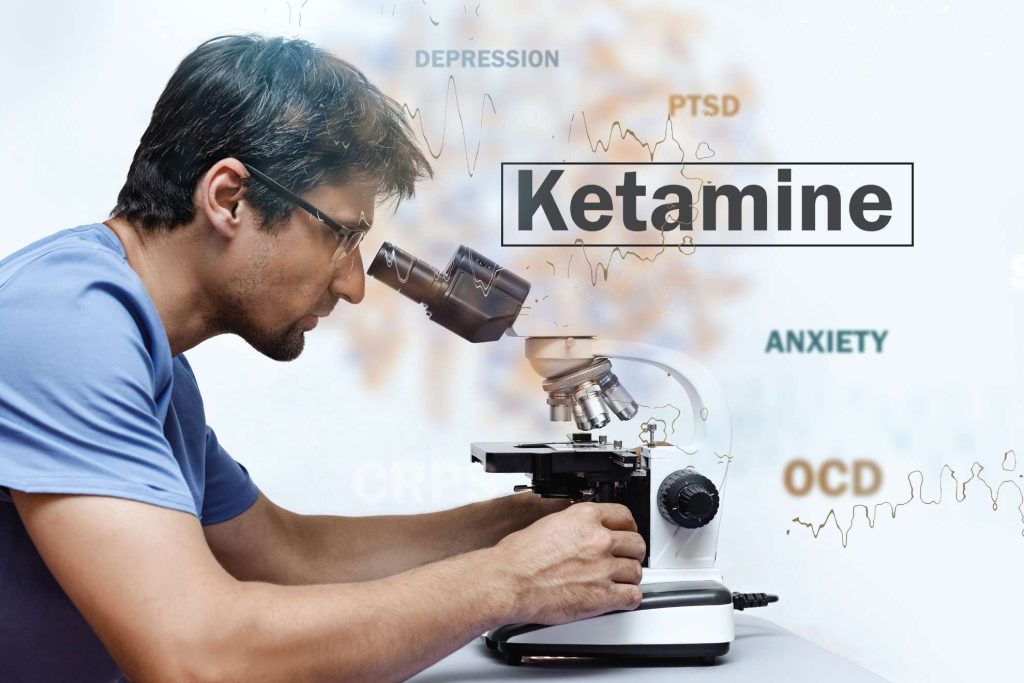5 amazing things you need to know about ketamine infusion therapy
Ketamine is a well-known powerful anesthetic that has been used in medicine for decades. One of the most remarkable uses for ketamine infusion therapy is in treating major depressive disorders. It works so well that scientists referred to it as "the most important discovery in half a century."
Ketamine therapy is not only used to treat depression, anxiety, and posttraumatic stress disorder more effectively than traditional antidepressants; the fact that it has been discovered to be a beneficial treatment for severe diseases such as rheumatoid arthritis, Crohn's disease, Lou Gehrig's disease, and COVID-19 symptoms is not well known
Only recently have researchers discovered the true potential of ketamine therapy, and there will undoubtedly be even more applications for this remarkable substance as further research is conducted. Continue reading to learn more about this amazing "Master Molecule."
What else can ketamine do?

1. Ketamine is a potent anti-inflammatory
Not only does ketamine therapy combat treatment-resistant depression symptoms and anxiety, but it is also a potent anti-inflammatory. It reduces chronic pain and swelling by inhibiting the release of specific immune cells in the blood called neutrophils and by reducing toxic chemicals known as cytokines.
Inflammatory Bowel Disease
Scientists are investigating IV ketamine's medical applications to determine its potential in treating inflammatory bowel disease (IBD). IBD, including Crohn's disease and ulcerative colitis, is thought to be caused by an autoimmune condition. Ketamine may aid the process by inhibiting neutrophil function and decreasing levels of inflammatory cytokines.
Chronic pain from inflammation
Ketamine therapy can also help with chronic pain caused by other inflammatory diseases, such as rheumatoid arthritis, osteoarthritis, and neuropathic pain. According to recent research by the American Academy of Pain Medicine, ketamine has been proven effective in various situations, including as a standalone therapy and as an add-on to opioids.1 Ketamine is non-addictive and has been found to reduce pain sensitivity in patients and reduce opioid use, making it an especially appealing choice for those who suffer from chronic pain and inflammatory conditions.
Neurodegenerative disorders
Ketamine therapy may also assist people with Amyotrophic Lateral Sclerosis (ALS). ALS has been linked to inflammatory causes, and ketamine may slow down the progression of muscle wasting, known as amyotrophy. Clinical trials are currently being conducted on ALS patients and other neurodegenerative disorders to investigate this hypothesis.2 Despite its infancy in research, the potential of ketamine seems to be boundless.
These applications are still in the very early stages of research, but the results so far have been promising. It presents an opportunity for individuals with inflammatory diseases to enjoy a better quality of life through reduced pain and improved mobility.

2. Ketamine therapy can reduce your stress response and improve immune function
When we are stressed or anxious, our bodies release excess cortisol into our bloodstream, which suppresses the immune system and causes us to become more vulnerable to diseases.
A ketamine infusion not only combats anxiety and depression; it also reduces the body's stress response. Ketamine infusions can reduce cortisol production, enhancing a person's ability to fight off severe infections and diseases by strengthening their immune system function.
It has been found that people who undergo a ketamine infusion experience an increase in immune cells called natural killer cells. These cells are responsible for killing off damaged or cancerous cells that could potentially grow into tumors and help us fight off viral infections.
In addition, studies have shown that ketamine is safe and effective at increasing a healthy person's immune response by reducing neutrophils and macrophages. Ketamine appears to promote inflammatory homeostasis. Ketamine works locally by interfering with the early steps in the immune response. It prevents local inflammation from worsening and spreading without stifling the process or delaying inflammation resolution.3 Ketamine also inhibits general anti‐inflammatory responses that overpower pro-inflammatory forces. To put it another way, ketamine is immune-modulatory rather than immune-suppressive.
3. Ketamine has brain regenerating properties
Ketamine, perhaps the most versatile medicine in the world, has some unique effects on our brains and spinal cords. Neuroplasticity is the brain's ability to change and adapt over time - in response to our environment, thoughts, and experience. Ketamine infusion therapy rapidly increases the connections between cells in the brain.
One of the ways that ketamine does this is by increasing levels of BDNF (brain-derived neurotrophic factor). Studies have shown that this protein appears to play a role in the growth of new blood vessels and neurons. Ketamine can help repair brain function by promoting the regrowth of neurons in the hippocampus, which is responsible for learning and memory.
Ketamine also stimulates brain cell regeneration and reduces inflammation of the brain and spinal cord. Studies show that ketamine infusion therapy increases the number and length of connections between brain cells, which may be why it may also be beneficial in treating neurocognitive conditions like Alzheimer's.4
Ketamine can re-wire your brain
A ketamine infusion can help brains re-wire themselves by creating or improving neural connections. When neurons fire, they produce new connections called dendrites. The more dendrites you have, the faster and better you can learn new things. That's why ketamine infusion therapy is so beneficial for helping people with learning disabilities like ADHD.
It has also been found that this type of therapy could affect long-term plasticity - allowing an individual to increase their ability to form specific memories, process information more efficiently, and remember specific details about past events. Our brains stay open to new experiences through our newly formed dendrite connections; our brain can "reboot" itself, allowing us to learn from our past experiences and react accordingly.
Ketamine can improve cognitive function
People who suffer from depression may also have serious cognitive issues, including memory loss and problems with learning, comprehension, and the ability to focus. They are usually given treatment that includes medications like SSRIs (Selective Serotonin Reuptake Inhibitors). These drugs function by making more serotonin available in the brain, which may aid mood and anxiety relief. However, that might come at the expense of energy and cognitive functioning.
Ketamine is a "smart drug"
Ketamine is not simply an antidepressant or anti-anxiety medication; it's also a smart drug. An IV ketamine infusion not only rapidly alleviates depression and anxiety symptoms but also improves a person's cognitive function because ketamine interacts with another chemical in the brain called glutamate - the most common neurotransmitter in the central nervous system.
Glutamate directly affects attention, learning, memory, and motivation. Research suggests that disruptions in the functioning of glutamate NMDA receptors in the brain cause this. Ketamine can help regulate synaptic plasticity by stabilizing these receptor sites improving cognitive function, including attention, learning, and memory. For this reason, ketamine infusion therapy may be beneficial for people who suffer from chronically low energy levels.
Ketamine also increases brain-derived neurotrophic factor (BDNF) levels in the brain's prefrontal cortex. BDNF is a protein that stimulates neurogenesis and new neuron formation. BDNF is comparable to a type of "miracle-grow" chemical in the brain, and the prefrontal cortex is involved with complex reasoning, judgment, social behavior, and how we interpret events. When we combine the two, the resulting improvement in cognitive performance may be dramatic.
4. Ketamine therapy is being used to treat severe illnesses from COVID-19 and Long COVID symptoms
Because ketamine is effective as an anti-inflammatory and improves immune function, researchers are now investigating a potential role in treating severe COVID-19 infections and post-Covid symptoms known as Long COVID.
COVID-19 Infections
Studies are underway to determine if patients who receive ketamine infusion therapy for COVID-19 could fight off the virus-related inflammation and survive. 5
"There is an urgent need to develop new treatments for COVID-19 using easily available and affordable medications," said Dr. Matthew Sims, director, Infectious Disease Research, Beaumont Health, and the study principal investigator. "Ideal new treatments for COVID-19 would help halt the progression of the disease in patients with mild cases before the need for ventilators and provide a rescue treatment for patients with severe cases of the virus."
Because most intensive care treatments for COVID infections are for respiratory failure and cardiovascular problems, they are also often accompanied by feelings of sadness and fear about dying. Standard central nervous system (CNS) depressants commonly used to help COVID-19 patients breathe do not hinder the viral pro-inflammatory burst; thus, they are ineffective in treating the physical or psychological consequences of being critically ill or on a ventilator.
Ketamine is a unique and safe medication that allows for well-controlled sedation and anesthesia while preventing depression and suicidal thoughts without affecting respiratory or cardiovascular function. And because ketamine is such a potent immunomodulator and anti-inflammatory drug, they believe that it may significantly decrease the severity of this disease by reducing the "cytokine storm" that occurs during severe infections, which are destructive to normal tissue and lead quickly towards death.6
Long COVID symptoms
Research suggests that ketamine also might be used as a rescue drug for patients with Long COVID symptoms that develop following the infection with COVID-19.7 Long COVID is associated with a variety of physical and mental symptoms. These can include headaches, intense tiredness, memory and thinking difficulties, as well as muscular disability and joint discomfort.
In addition to physical symptoms, Long COVID suffers also report a variety of mood disorders that can include depression, anxiety, and PTSD. Studies have shown that; 1 month after discharge from the hospital following COVID infection, 10% of the COVID-19 population reported depression and post traumatic stress disorder, while 50% acknowledged depression during the treatment.8
Ketamine has such unique and rapid pain-relieving properties and cognitive improvement benefits; it is encouraging to think that ketamine infusion therapy will be beneficial in treating Long COVID. By effectively treating episodes of depression, brain fog, and suicidal thoughts that accompany Long COVID while at the same time providing physical relief from the pain and extreme fatigue that accompanies Long COVID.
More work must be done in this area, but the prospects are fascinating.
5. Ketamine infusion therapy can be helpful for those recovering from addiction.
Alcohol and illegal drug use are significant public health problems that are growing more serious. The global prevalence of alcoholism and illicit drug addiction in 2010 was 9.6 percent and 10.9%, respectively (1). In certain countries, owing to increasing rates of opioid usage, mortality rates have skyrocketed to pandemic levels.
The opioid epidemic has reached a new level of devastation in the United States, where more than 64,000 people died from drug overdoses in 2017 alone. In 2013, the Centers for Disease Control and Prevention reported that there were more than 334 million prescriptions written for opioids annually.
Addiction and substance use disorders include cognitive, behavioral, and physiological symptoms. The hallmark signs of addiction include impaired control, cravings, social impairment, risky use, and withdrawal symptoms.
Ketamine treatment can help with addiction during rehabilitation by alleviating treatment-resistant depression and anxiety symptoms that often accompany withdrawal from the drug of abuse. More than that, ketamine may also help those recovering from drug or alcohol addiction because it affects specific brain pathways that can affect cravings.9
Researchers have found that a ketamine infusion can reduce the cue-induced craving for cocaine as well as methamphetamine use. Ketamine also shows the same craving reduction abilities in alcoholism and opioid addiction.
It is important to note that the FDA has not approved ketamine infusion treatment for addiction, and researchers still need more information on this topic. However, we know that ketamine infusions for severe pain and depressive disorders
Ketamine - the Master Molecule
Ketamine is genuinely a "Master Molecule" with many different and rapidly evolving medical purposes. Widely recognized as the most quickly effective therapy for treatment-resistant depression, anxiety, and PTSD, it is also being used as an anti-inflammatory in the areas of brain regenerative properties, fighting addiction, and with serious illnesses such as COVID-19 and Long COVID.
Although more research needs to be performed, some promising evidence suggests that ketamine can help treat COVID-19 and Long COVID. Some patients receive ketamine infusions for years with relief, while others say the treatment's effects fade over time. The FDA has fast-tracked two ketamine-based drugs, though, and hopefully, more trials and research will follow soon.
Don't hesitate to reach out to us if you suffer from any of these conditions or want more information on ketamine infusions for depression treatment. We would be glad to help.
We are committed to what we do. We will use all our knowledge, experience, and expertise to help you. And while we cannot promise success in every case, we can promise and guarantee that we will make every possible effort and take every step necessary to ensure that you have the best possible chances of recovery with RESTORE.
RESTORE is the new “Gold Standard” in ketamine-based therapy
____________________________________
The RESTORE infusion program is an advanced program that unlocks the full benefit of ketamine. It is the most rapidly acting, effective, and longest-lasting ketamine-based infusion available today.
If you would like to learn more about the RESTORE program, please feel free to visit our website and clinical research center (ketamineinstitute.com). We are also available to assist you with a free private consultation, please feel free to call us at 800-850-6979, we want to help.
We don’t treat patients, we treat people - one person at a time.
References:
- Eric S. Schwenk, MD, Eugene R. Viscusi, MD, Asokumar Buvanendran, MD, et al.Consensus Guidelines on the Use of Intravenous Ketamine Infusions for Acute Pain Management From the American Society of Regional Anesthesia and Pain Medicine, the American Academy of Pain Medicine, and the American Society of Anesthesiologists. Reg Anesth Pain Med. 2018 Jul; 43(5): 456–466.Eric S. Schwenk, MD, Eugene R. Viscusi, MD, Asokumar Buvanendran, MD,et al., <https://www.ncbi.nlm.nih.gov/pmc/articles/PMC6023582/>
- Inacio, P. Ketamine Earns FDA's Orphan Drug Designation, ALS News, August 2012 < https://alsnewstoday.com/news-posts/2021/08/06/ketamine-fda-orphan-drug-designation-als-treatment/>
- Marc De Kock, Sebastien Loix,Patricia Lavand'homme. Ketamine and Peripheral Inflammation. CNS Neurosci Ther. 2013 Jun; 19(6): 403–410,<https://www.ncbi.nlm.nih.gov/pmc/articles/PMC6493703/>
- Neil Smalheiser, MD. Ketamine: A Neglected Therapy for Alzheimer Disease. Front Aging Neurosci. 2019; 11: 186. Front Aging Neurosci. 2019; 11: 186. <https://www.ncbi.nlm.nih.gov/pmc/articles/PMC6667975/>
- Sims, M. Study of Immunomodulation Using Naltrexone and Ketamine for COVID-19 (SINK COVID-19). Clinicaltrial.gov 2020.<https://clinicaltrials.gov/ct2/show/NCT04365985>
- Avi A Weinbroum. Perspectives of Ketamine Use in COVID-19 Patients. J Korean Med Sci. 2021 Jan 25;36(4), <https://jkms.org/pdf/10.3346/jkms.2021.36.e28>
- Karolina Akinosoglou, Athanasios Gogos, Charalambos Papageorgiou, et al. Ketamine in COVID‐19 patients: Thinking out of the box. J Med Virol. 2020 Dec 1, <https://www.ncbi.nlm.nih.gov/pmc/articles/PMC7753268/>
- Park HY, Jung J, Park HY, Lee SH, Kim ES, Kim HB, et al. Psychological consequences of survivors of COVID-19 pneumonia 1 month after discharge. J Korean Med Sci 2020;35(47):e409, <https://www.ncbi.nlm.nih.gov/pmc/articles/PMC7721563/>
- Jennifer L. Jones, Camilo F. Mateus, Robert J. Malcolm, et al. Efficacy of Ketamine in the Treatment of Substance Use Disorders: A Systematic Review. Front. Psychiatry, Jul 24, 2018,<https://www.frontiersin.org/articles/10.3389/fpsyt.2018.00277/full>

